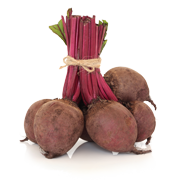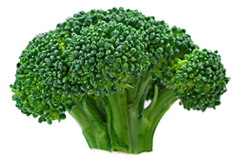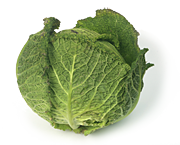 Beets
Beets
Beets are an important dietary source of betaine, and also a good source of folate. These two nutrients work synergistically to reduce potentially toxic levels of homocysteine, a naturally occurring amino acid that can be harmful to blood vessels. Too high levels of homocysteine can contribute to the development of heart disease, stroke, dementia and peripheral vascular disease (reduced blood flow to the legs and feet). Beets are also loaded with potassium, a vitally important mineral for heart health. Beets can be baked, broiled, steamed, or shredded raw and added to salads and slaw's.

Broccoli
Broccoli is vegetable royalty and is an excellent source of a family of anticancer phytochemicals called isothiocyanates. Isothiocyanates fight cancer by neutralizing carcinogens, the “bad guys” of the cancer battle. Studies have shown that isothiocyanates help prevent lung and esophageal cancer and can lower the risk of other cancers, including gastro-intestinal, prostate and gastric cancer. Broccoli contains indole-3-carbinol, which in addition to being a strong antioxidant and stimulator of detoxifying enzymes, seems to protect the structure of DNA. This is especially important for women as it also reduces the risk of breast and cervical cancer. Steamed with fresh garlic and olive oil, broccoli is a heart saver!
Celery
Celery just might be the number one medicinal food for blood pressure. The substances in celery that seem to produce this benefit are phytochemicals called phthalides. Clinical studies show that they work by relaxing the muscle tissue in artery walls thereby increasing blood flow. Phthalide also lowers levels of stress hormones. Celery is also a great source of silicon, which is receiving a lot of attention as a very important nutrient for bone health. Because of its silicon content, celery can help renew joints, bones, arteries, and all connective tissue. There’s also an ingredient found in celery called acetaminophen, which have been shown to stop the growth of cancer cells. Smear a spoonful of almond butter on it, and you have a perfect low-sugar snack that’s pretty filling.
Kale
 In rankings, Kale comes out on top according to the USDA. This agency looks at all the different antioxidants and phytochemicals that are found in a plant food and determines how well everything works together as a team. In simple English, that translates to how much actual ability the "team" has to fight cell-damaging free radicals. Because it's a cabbage, kale actually has even more benefits than its antioxidant power alone would indicate. Not only does kale contain powerful phytochemicals like cancer - fighting indoles, but plant compounds have been found to have a protective effect against breast, cervical and colon cancer. Kale also contains sulforaphane, which helps give a boost to the body's detoxification enzymes, and may actually help fight cancer as well. Tender kale greens can provide a terrific addition to salads, especially when mixed with strong flavored ingredients like tamari roasted almonds.
In rankings, Kale comes out on top according to the USDA. This agency looks at all the different antioxidants and phytochemicals that are found in a plant food and determines how well everything works together as a team. In simple English, that translates to how much actual ability the "team" has to fight cell-damaging free radicals. Because it's a cabbage, kale actually has even more benefits than its antioxidant power alone would indicate. Not only does kale contain powerful phytochemicals like cancer - fighting indoles, but plant compounds have been found to have a protective effect against breast, cervical and colon cancer. Kale also contains sulforaphane, which helps give a boost to the body's detoxification enzymes, and may actually help fight cancer as well. Tender kale greens can provide a terrific addition to salads, especially when mixed with strong flavored ingredients like tamari roasted almonds.
Onions
Onions belong to the allium family, which also includes leeks, garlic and shallots. They contain a whole pharmacy of compounds with health benefits, but those smelly sulfur compounds also offer a lot of nutritional bang. Numerous studies also show that onions build strong bones, and a compound in onions inhibits the activity of the cells (Osteoclasts) that break down bones. Onions contain powerful antioxidants and are anti-inflammatory, antibiotic and antiviral. They are a great source of quercetin that is associated with beneficial effects on chronic diseases like cancer and heart disease. Quercetin may also help relieve allergies and prevent complications of diabetes. The type of onion affects the content of the health-promoting chemicals, and the stronger tasting ones have superior properties.
Spinach
Spinach is loaded with vitamins and is one of the best sources of Vitamin K. Vitamin K is critically important for building strong bones and actually activates a compound call osteocalcin that anchors calcium molecules inside the bone. Calorie for calorie, green leafy vegetables like spinach provide more nutrients than almost any other food on the planet. Spinach is a great source of calcium and a great alternative to diary for people who do not wish to drink milk. It's also contains vitamin A, manganese, folic acid, magnesium, iron, vitamin C, and a powerful anti-inflammatory compound called quercetin. In addition, it also contains lutein, which helps prevent macular degeneration in is instrumental in both lung and heart health.
Sweet Potatoes
Sweet Potatoes are not actually related to the potato, but are a member of the morning glory family. They’re sweet, dark and one of the oldest vegetables known to man, having been around since prehistoric times. This starchy carbohydrate is high in fiber (half of which is soluble), and a rich source of powerful antioxidants in the carotenoid family, especially beta-carotene. Sweet potatoes are loaded with vitamin A and heart healthy potassium. A recent article in the Journal of Agriculture and Food Chemistry found that an extract from baked sweet potato as chemo preventive (cancer-fighting) properties. If you don’t have any blood sugar issues, sweet potatoes are a great food, but if you do, eat them in reasonable amounts with a mixed meal containing protein. One baked sweet potato provides more than 8,800 IUs of vitamin A, yet it contains only 141 calories. This nutritious vegetable also provides about half your daily requirements of vitamin C.
